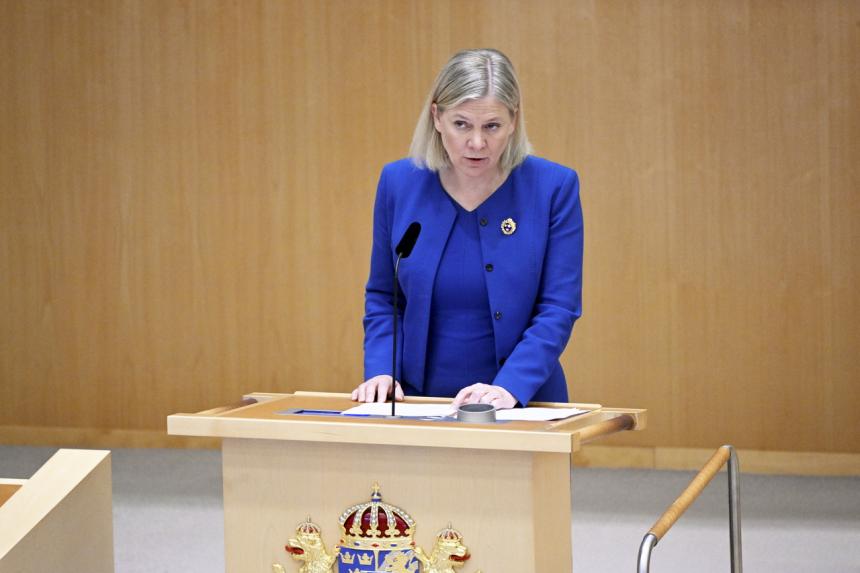STOCKHOLM, (Reuters) – Sweden’s government has formally decided to apply for NATO membership, Prime Minister Magdalena Andersson said today, setting it on the road toward ending military non-alignment that lasted throughout the Cold War.
Sweden’s governing Social Democrats dropped their 73-year opposition to joining NATO yesterday and are hoping for a quick accession, following Russia’s Feb. 24 invasion of Ukraine.
“The government has decided to inform NATO that Sweden wants to be accepted as a member of NATO, ” Andersson told reporters, adding that the application could be handed in today, tomorrow or Wednesday and would be synchronised with Finland.
The decision to abandon the military non-alignment that has been a central tenet of Swedish national identity for two centuries marks a sea change in public perception in the Nordic region following Russia’s attack on its neighbour.
“Europe, Sweden and the Swedish people are living now in a new and dangerous reality,” Andersson said during a debate on security policy in parliament today.
However, she said Sweden did not want permanent NATO military bases or nuclear weapons on its territory if its membership was approved.
There is broad backing in parliament for an application, though the government does not need its approval to go ahead. Finland yesterday also confirmed it would apply to join the Atlantic military alliance.
One obstacle has already emerged even before the applications have landed at NATO’s Brussels headquarters.
Turkey surprised its NATO allies by saying it would not view applications by Finland and Sweden positively, mainly citing their history of hosting members of Kurdish militant groups.
President Tayyip Erdogan called the Scandinavian countries “guesthouses for terrorist organisations”.
Defence Minister Peter Hultqvist said today that Sweden would start diplomatic discussions with Turkey to try to overcome Ankara’s objections to its plan to join NATO.
“We will send a group of diplomats to hold discussions and have a dialogue with Turkey so we can see how this can be resolved and what this is really about,” Hultqvist told public service broadcaster SVT.
Turkey has said it wanted the Nordic countries to halt support for Kurdish militants on their territory, and to lift bans on sales of some weapons to Turkey.
Turkish state media said separately that Sweden and Finland had rejected requests for the repatriation of 33 people that Turkey alleges have links to groups it deems terrorists.
Sweden’s Foreign Ministry did not immediately reply to a request for comment.
NATO and the United States said they were confident Turkey would not hold up membership of Finland and Sweden.
Any decision on NATO enlargement requires approval by all 30 members of the alliance and their parliaments. Diplomats said Erdogan would be under pressure to yield as Finland and Sweden would greatly strengthen NATO in the Baltic Sea.
“I’m confident that we will be able to address the concerns that Turkey has expressed in a way that doesn’t delay the membership,” NATO Secretary-General Jens Stoltenberg said on Sunday.
The parliamentary debate in Sweden, a formality as there is already a broad majority behind an application, also gave a chance for the two parties still opposed to a NATO membership application to voice their concerns.
“The decision … to join a nuclear-armed alliance with authoritarian regimes is being made with no input from voters,” Left Party leader Nooshi Dadgostar said. “There are other ways of keeping Sweden safe.”






